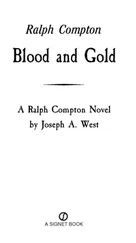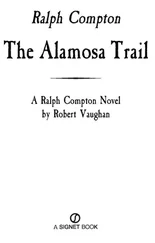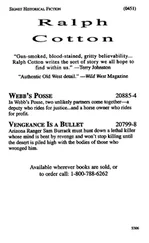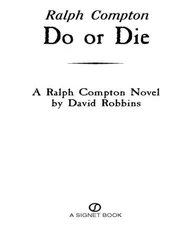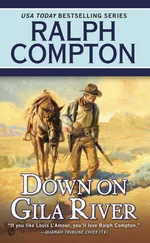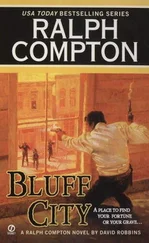Ralph Compton - West of the Law
Здесь есть возможность читать онлайн «Ralph Compton - West of the Law» весь текст электронной книги совершенно бесплатно (целиком полную версию без сокращений). В некоторых случаях можно слушать аудио, скачать через торрент в формате fb2 и присутствует краткое содержание. Год выпуска: 2008, ISBN: 2008, Издательство: Thorndike Press, Жанр: Старинная литература, на английском языке. Описание произведения, (предисловие) а так же отзывы посетителей доступны на портале библиотеки ЛибКат.
- Название:West of the Law
- Автор:
- Издательство:Thorndike Press
- Жанр:
- Год:2008
- ISBN:9781410409225
- Рейтинг книги:4 / 5. Голосов: 1
-
Избранное:Добавить в избранное
- Отзывы:
-
Ваша оценка:
- 80
- 1
- 2
- 3
- 4
- 5
West of the Law: краткое содержание, описание и аннотация
Предлагаем к чтению аннотацию, описание, краткое содержание или предисловие (зависит от того, что написал сам автор книги «West of the Law»). Если вы не нашли необходимую информацию о книге — напишите в комментариях, мы постараемся отыскать её.
West of the Law — читать онлайн бесплатно полную книгу (весь текст) целиком
Ниже представлен текст книги, разбитый по страницам. Система сохранения места последней прочитанной страницы, позволяет с удобством читать онлайн бесплатно книгу «West of the Law», без необходимости каждый раз заново искать на чём Вы остановились. Поставьте закладку, и сможете в любой момент перейти на страницу, на которой закончили чтение.
Интервал:
Закладка:
He closed the window, letting the curtain fall back into place, and as he stepped away he shed his shoulder rig. He slid the gun from the leather, placed it on the stand by the bed and stretched out, staring at the ceiling.
What he had just witnessed disturbed him deeply. The oldest of the Chinese girls had looked to be about fourteen and the three others were even younger. There was no doubt in McBride’s mind that the girls, children really, had been terrified, cowed into obedience by abuse they’d already suffered. Maybe Red Beard did more with that bullwhip than use it as a pointer.
John McBride swore, telling himself angrily that the fate of four Chinese girls was no concern of his. His orders from Inspector Byrnes—and they had been orders—were to lose himself in the Western lands, lie low and wait until told that it was safe to return to New York. He was young, not yet thirty, and he could resume his police career where he left off. With hard work and a bit of luck he might well end up as an inspector of detectives himself. It was possible. More than possible, it was very likely.
Yes, he was still a law officer. But in New York, not here, not in this wooden shantytown in the middle of nowhere. What happened in High Hopes was hardly his business. Hadn’t the railroad clerk told him that the way to stay alive in the town was to see nothing, hear nothing, say nothing, like the three Chinese monkeys?
McBride shook his head in irritation. Now, why did he have to go and think about the Chinese again, even if it was only monkeys? He undid his tie and celluloid collar and laid them on the bed stand with his watch. Then he heeled off one of his elastic-sided ankle boots but had to sit up and remove the other. Wiggling his toes in his socks, he blew out the oil lamp, stretched out on the bed again and closed his eyes.
But sleep would not come to him.
No matter how hard he tried to clear his racing mind, the scared faces of the girls kept coming back to haunt him and an iron fist twisted his heart in his chest.
Outside the boisterous town was as noisy as ever, the saloons going full blast and the street still crowded with people, and once he heard a flurry of shots followed by a woman’s scream. Whatever had happened, a killing or some drunken rooster shooting at the moon, High Hopes ignored it and the free-spending miners led the festivities as before.
Tired as he was from his long journey west, McBride gave up the unequal struggle. There would be no sleep until the dawning sun told the town it was time to turn off the lamps and seek the blankets. McBride rose and padded in his stocking feet across the floor to the window. The cage was gone, but now there was something else to attract his interest—a woman.
A woman like no other he’d ever seen.
She stood on the boardwalk outside the saloon, and even in the darkness her beauty burned like a flame. Thick auburn hair was piled high on her head and she wore a low-cut dress of vivid red silk. A thin ribbon of the same color encircled her slim neck, and her shoulders were bare, revealing the swell of her breasts and the deep, shadowed V of cleavage. Her face was oval in shape, and her eyes were large and set wide apart, her lips full, scarlet and inviting.
She was, McBride decided, the most beautiful woman he’d ever seen. Even back in New York, a city renowned for its exquisite women, she would have stood out from the rest.
Like a rose among thorns, McBride thought, pleased that he could still wax poetic, despite the life he’d led, a life where nothing had come easy and the pursuit of criminals and the probing of their often terrible deeds had calloused his soul. In that moment, in a single, blinding flash of realization, he knew he must have this woman, that somehow, some way, she must be his.
There were ominous signs to be read, but blinded by the woman’s breathtaking beauty, McBride did not read them. He would pursue the woman in the red dress clean, with no predetermined notions or conditions.
He was new to the West and did not know that among the Sioux, Cheyenne and many other Indian tribes, red is the color of conflict, wounds and violent death.
He did not know it then, but it was a thing he was destined to learn.
Two men stood with the woman, close enough to her that they shaped up to be at least acquaintances. The man at her elbow was tall and as big as McBride himself, but much more handsome in a cheap, flashy way. He sported a thick mane of yellow hair, obviously pomaded, and a trimmed, full mustache calculated to set female hearts aflutter. He was dressed in a well-cut suit of gray broadcloth and a diamond stickpin glittered in his cravat. Whoever he was, self-assured and relaxed even in the company of a beautiful woman, the man projected an image of wealth and raw, arrogant power.
Beside him, his face lost in shadow under a wide-brimmed hat, stood a smaller man that McBride decided could be only Hack Burns. He wore two guns in crossed belts, hung low on his hips, but unlike the bigger man, he was not in the least relaxed. McBride saw his head slowly turn this way and that with the icy menace of a cobra as he studied faces in the passing crowd. There was a readiness about Burns that reminded McBride of a tensed spring about to violently uncoil. He had seen the gunman’s like before, back in the Four Corners, sudden, cold-eyed men who would kill for money without emotion or a pang of conscience.
McBride made up his mind that he wanted no part of Hack Burns. Not then, not ever.
He stepped away from the window, lit the oil lamp, then sat on the bed and pulled on his boots. He rose and slipped his suspenders over his shoulders. The night was hot and he decided to forgo his coat and collar. A glance in the mirror told him that he badly needed a shave. He rasped a hand over his lean cheeks, but decided the razor could wait. Right now he had to see the woman again— up close and personal.
John McBride slipped his gun into his right pants pocket, settled his plug hat on his head and left the hotel . . . stepping into a roaring night streaked with lamplight.
Chapter 4
The Golden Garter Saloon was packed wall-to-wall with people, gold miners mostly, in from the Spanish Peaks to spend their dust, a sprinkling of flushed punchers with their wide-brimmed hats tipped back, spurs chiming on their heels, and a few women in short dresses of vivid yellow, blue or green silk.
As he made a place for himself at the bar, McBride’s eyes scanned the smoke-filled room, but he saw no sign of the woman in the red gown.
The bartender, his pomaded hair parted in the middle of his head, slicked down shiny and flat on either side, asked McBride to name his poison. The product of a drunken, violent father, McBride had long ago sworn off alcohol, but he ordered a beer and let it sit, the foam settling as its tiny bubbles popped.
He saw her then.
A momentary parting of the crowd revealed the far corner of the saloon. She was sitting at a table with four miners, studying the playing cards in her hand. Stacks of poker chips stood on the table in front of her and surprisingly, given her surroundings, a small silver tray holding a steaming china teapot and a cup and saucer.
The woman’s eyes met McBride’s for an instant—dark hazel, he noticed—then dropped to her cards again, long lashes lying on her cheek-bones like spread black fans.
The throng crowded together again and she was once more lost from his sight.
McBride turned to the man at his side, a young miner wearing a plaid shirt, a seaman’s woolen cap on his head.
‘‘Can I buy you a drink?’’ he asked.
For a moment the man looked surprised, but then he shrugged and said, ‘‘Sure, why not? Whiskey.’’ He stuck out his hand. ‘‘Name’s Jim Palmer, harpooner, late of good old Nantucket Town. Now I’m here at the diggings.’’
Читать дальшеИнтервал:
Закладка:
Похожие книги на «West of the Law»
Представляем Вашему вниманию похожие книги на «West of the Law» списком для выбора. Мы отобрали схожую по названию и смыслу литературу в надежде предоставить читателям больше вариантов отыскать новые, интересные, ещё непрочитанные произведения.
Обсуждение, отзывы о книге «West of the Law» и просто собственные мнения читателей. Оставьте ваши комментарии, напишите, что Вы думаете о произведении, его смысле или главных героях. Укажите что конкретно понравилось, а что нет, и почему Вы так считаете.

